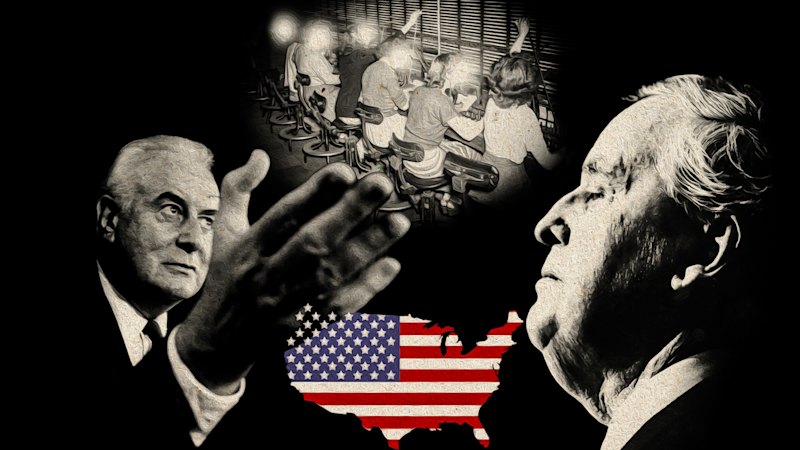
Barry Nash will never forget the moment his family uncovered a secret that would remain hidden for nearly half a century. “I vividly recall the look of absolute horror on Mum’s face and the heated discussion that followed,” Barry recounts. The Nash family had stumbled upon a political intrigue that, if revealed, could have torn their family apart and altered Australia’s political landscape.
In the days following the discovery, Win Nash, Barry’s mother, informed her family about two more phone calls she overheard between Marshall Green, the U.S. Ambassador to Australia, and Queensland Premier Joh Bjelke-Petersen. “One could safely surmise that Green was ensuring Bjelke-Petersen would continue his vital role in bringing about the downfall of the Whitlam government,” Barry explains.
The Unfolding of a Political Conspiracy
The family’s sense of foreboding intensified with another call Win partially overheard. This time, the caller was Wiley Fancher, a right-wing American residing in Queensland, calling from Zurich. Barry recalls his mother’s agitation upon returning home that night, having overheard Fancher and Bjelke-Petersen discussing the Whitlam government. The historical significance of the call became apparent only later.
In December 1975, Labor frontbencher Tom Burns described Fancher as a “shady financial dealer” in the Queensland parliament, linking him to Bjelke-Petersen. The following year, federal parliament heard allegations that Bjelke-Petersen had dispatched Fancher to Europe in late 1975 to dig up compromising material on the Whitlam government’s loan activities.
The Nash family long suspected that Fancher facilitated the calls between Green and Bjelke-Petersen. On July 30, 1975, Green’s ambassadorship ended, and he returned to Washington. By September 9, Bjelke-Petersen’s nomination of Albert Field, a former Labor member, was sworn in as the new independent senator for Queensland, tipping the Senate balance.
The Whitlam Dismissal and Its Aftermath
On October 15, 1975, the Loans Affair engulfed the Whitlam government, leading to the “reprehensible circumstances” opposition leader Malcolm Fraser needed to justify blocking the budget in the Senate. With Field absent due to an ALP legal challenge, the opposition’s motion to block supply passed by a single vote. This financial impasse prompted Governor-General Sir John Kerr to dismiss the Whitlam government, a move unprecedented in Australian federal history.
Barry likens the family’s knowledge of the plot to being on the Titanic, aware of the impending iceberg but powerless to act. When Kerr dismissed Whitlam on November 11, 1975, Helen Nash recalls the news hitting her mother like a body blow. “She had heard the details of a coup and now it had happened,” she says.
Speculation about CIA involvement in Whitlam’s dismissal began almost immediately. In 1988, Green denied any U.S. intelligence role, stating, “Our people weren’t operating behind your back.” However, declassified documents have since revealed Washington’s antipathy towards Whitlam and an early recognition that Senate defeat could lead to a change in government.
Historical Context and Expert Analysis
Historian Professor James Curran notes that in October 1974, Green predicted the government’s fall within six to twelve months, a sentiment echoed in meetings with media mogul Rupert Murdoch. Murdoch had briefed Green on a conversation with Kerr about potential supply issues if Whitlam’s Senate hold weakened. Green’s communications to Washington reflected a belief that elections might be triggered by Senate appropriation refusals.
Retired Griffith University academic Stephen Stockwell, who recently published a book on the Whitlam dismissal, finds the Nash family’s revelations unsurprising. “While the Nash family’s information is hearsay in legal terms, it is compelling historical evidence of U.S. overreach in subverting a fellow democracy,” Stockwell asserts.
“While it is true that Joh Bjelke-Petersen did not require encouragement to oppose the Whitlam government, that Green rang on three occasions to drive home his point is evidence of the deep concern the United States had about their base at Pine Gap near Alice Springs and its future under the Whitlam government,” Stockwell says.
Stockwell’s research, including documents from the Gerald Ford Presidential Library, indicates the U.S. National Security Council’s interest in Australia from August 1974. The report to National Security Study Memorandum 204 highlights U.S. concerns about losing control of the Pine Gap base.
Legacy and Reflections
Barry Nash remains convinced that Marshall Green played a crucial role in orchestrating Whitlam’s dismissal. “What she heard was the gun being loaded. It was a huge moral burden for her because she harboured the nation’s biggest secret,” he reflects.
In July 1977, Warren Christopher, Deputy Secretary of State under President Jimmy Carter, met with Whitlam, then opposition leader, to convey a message of respect for Australia’s democratic processes. Whitlam recorded in his memoirs that Christopher assured him the U.S. would not interfere in Australia’s domestic politics again.
That same year, a referendum altered the Australian Constitution to ensure that Senate vacancies are filled by someone from the same political party as the departing senator, reflecting a desire to prevent future political manipulations.
Win Nash retired from Telecom in 1990, receiving a medallion for her service. Despite her contributions, she wished she could have done more to reveal the truth.







